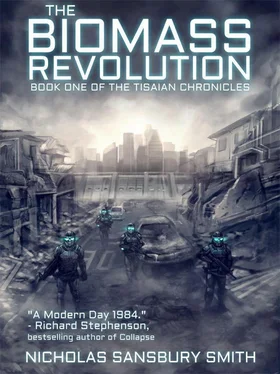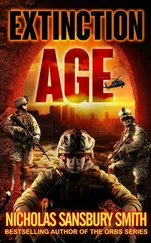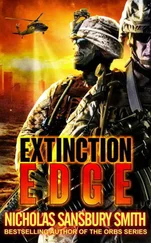Ing leaned closer to Spurious and whispered across the table.
“Oh yeah? What can you tell us? Anything secretive going on?”
Spurious cracked a half smile and shot Ing a quick glance before taking a large bite out of his sandwich.
He chewed loudly while he spoke. “You know I’m not at liberty to say, but…”
“But what Spurious?”
Spurious shook his head. “It’s nothing, nothing important.”
Ing rolled his eyes before staring at his porridge. “You get to see all the neat stuff,” he said, swirling his spoon playfully in the creamy soup.
“I wish I had something to keep me busy. I don’t know if I can wait another five years to get out of this place. It really is a nightmare, doing the same old thing day in and day out. Maybe I should get a fish to stare at, too,” Paulo said, frowning.
“Five years isn’t that long. You’ve been here for how long? Twenty years? Another five isn’t going to kill you,” Spurious reassured his friend.
Paulo looked down at his small bowl of browning cabbage. His eyes were rimmed with creases and his eyes were dull. Strands of receding blonde hair crept down his forehead and crawled down his thick sideburns like a vine down a tree. Ing looked at Spurious, blatantly concerned.
Ever since Paulo lost his promotion, things had changed. After waiting five years for a transfer to the Sector of the Treasury, Paulo was to be promoted to Bureau Chief of Insurance Claims, which also marked quite the raise in salary. If he played his cards right, he might have been able to move out of government housing and buy a small condominium outside the Commons, where the rest of the workers lived. That dream ended one day when Paulo forgot to turn off his computer, lamp, and office light before going home from work for the third time. His penalty was a write-up, costing him his promotion.
The once articulate and outspoken man seemed broken and aged. Ing and Spurious knew they had to continue to try and motivate their old friend. With his golden years ahead, he should be managing a group of young people Spurious’ age, but due to a small mistake, his life was put on hold for at least another five years, if not indefinitely.
Spurious took one last bite out of his sandwich before he turned to Paulo, attempting to cheer him up. “Tell us about the time you did an audit at the Biomass factory outside the city limits. I’ve been hearing rumors they are creating an even more efficient Biomass.”
The old man blinked a few times, as if he was trying to remember. “Oh yes, the one I traveled to a year or so ago. It was a magnificent facility. The factory floor was lined with circular fuel tanks that rose hundreds of meters into the air. Workers in blood red uniforms raced about, checking the blue screens on each individual tank. It was quite the operation.”
For a moment Spurious thought of his father who had worked in a similar facility, long after the State assumed operations from the private company that controlled the Biomass.
“Do you remember the Tisaian Corporation?” Spurious asked.
Paulo nodded quickly in between bites. “How could I forget? Those bastards were the first to use the hybrid soybean seeds that created Biomass.”
“Those bastards?” Ing interrupted. “The Tisaian Corporation solved the world’s fuel problems practically overnight. Why do you think they named Tisaia after them? They are heroes.”
“And they also sparked WWIII when they did. Heroes don’t create wars. They end them.” Paulo fired back. “Oh that’s right you are too young to remember The Biomass Wars. When nations fought over the rights for the seeds. And you probably wouldn’t remember these seeds can only be grown in fertile top soil—top soil found in only a few locations after 21st century farming destroyed most of it.”
Spurious interrupted the brewing argument with a cough. “You guys. Stop arguing. It doesn’t matter who created Biomass. All that matters is whether the State can create enough to share it with the outside world.”
“That will never happen, Spurious. I don’t understand why the government wants to hoard the Biomass, but they do.” Paulo mumbled between bites of his cabbage.
Ing laughed. “Well your memory clearly goes back longer than mine, but I’m willing to guess it’s because there isn’t anyone left in the world to share it with.”
Paulo looked up, half way between his next bite. “Then the State has already succeeded in making you believe what they want you to believe.” He glanced over at Spurious for a split second. “Remember, what we’re led to believe is not always the truth.”
“It bothers you that the State denies the existence of other governments?” Spurious asked.
“It doesn’t bother you?” Paulo said, running a hand through his thinning hair.
“Well it’s simply not true, guys. If there’s any government left we would know about it. There would be evidence,” Ing piped in.
Paulo snickered. “Ah, what it would be like to be young and ignorant again,” he said, rising from his seat. “I’ll see you two later. Clearly I’m not going to get through to you today.”
Lunch ended as abruptly as Paulo had lost his promotion. It was becoming a common occurrence. Spurious or Ing would say something that upset him and the next thing they knew he would be headed back to his cube. Today was no different, but for some reason Spurious felt a sense of excitement. Not because he had upset Paulo, but because regardless of who was right, this was truly an exciting time for humanity. If this new Biomass was capable of what he had heard, then perhaps things would begin to change. Perhaps things would go back to the way they were in the old world—the world his father used to tell him stories about.
Time: 7:18 p.m. January 19, 2071
Location:Commons Building 21, Apt 44. Lunia, Tisaia
A freezing rain punished Spurious as he rushed down the cobblestone walkway towards his housing complex. The silhouettes of destroyed skyscrapers towered above in the distance, appearing oblique in the darkness. They were now nothing more than artifacts from the past, like the pyramids he had read about as a child.
He pulled his eyes away from the eerie structures, tugging his hood over his head to cover his chapped face, protecting his eyes from the cold, unforgiving wind and rain. A row of street lights glowed within the protection of their glass cases, illuminating the archaic brick walkway below. A strained power line whined in the wind as it carried the Biomass life source to the commons buildings, like blood through a vein.
Spurious continued down the path, nuzzling his face into the collar of his coat. He had taken the six o’clock underground trolley home tonight, opting from walking the near five miles from his office to his apartment due to the freezing rain. He clutched the copper railing tightly, the metal stained green like the rooftop above. A radiant orange glow from several lights guided him to the fourth floor, where he pulled open a massive oak door revealing a hallway lined with blood red doors. His apartment was at the far end, the last door on the right. He slugged down the creaky wooden floor and inserted his key into the lock with a mechanical click.
Dwarfed by the skyscrapers in the distance, the commons buildings were small and cramped for large families. The architecture was late 20th century, defined by pointed arc windows, steep gables, and stone veneer. Before the Biomass Wars, they were used to house distinguished politicians who traveled to the capitol city once a year for a three month legislative session. After the war ended, the common buildings had been rebuilt on a massive scale to house all State workers. It was one of the few perks these workers shared. The citizens living outside Lunia enjoyed far less luxury, often squatting in the metal intestines of destroyed skyscrapers, or congregating in stone buildings constructed hastily in Rohania.
Читать дальше












